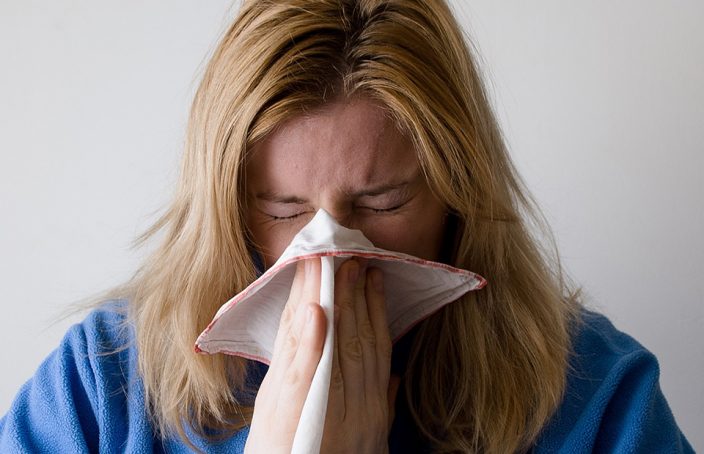ASK A PHARMACIST: STAYING HEALTHY DURING COLD AND FLU SEASON
Written By: Malissa Carroll, Web Content Specialist
The holidays might be over, but cold and flu season is just reaching its peak. While many of the ailments often associated with the winter months usually aren’t serious for healthy adults, their symptoms can leave people feeling miserable and cause them to miss time with family and from work and school. For children and older adults, the risk for developing complications from these illnesses is much higher. In fact, more than 200,000 people are hospitalized for flu-related complications each year.
However, there are steps that all individuals can take to reduce their risk of becoming sick during winter. Below, Tim Rocafort, PharmD, BCACP, assistant professor in the Department of Pharmacy Practice and Science (PPS) at the School of Pharmacy, answers some frequently asked questions about the common cold and flu, and offers advice to help people stay healthy.
Are people more likely to become sick in the winter?
Health care professionals continue to debate the reasons why people seem more likely to become sick in the winter. Recent studies have shown that some viruses responsible for the common cold and flu peak during this time because they are able to replicate easier. Combine this knowledge with the fact that our immune systems are also less efficient at protecting us against certain viruses during the colder months of the year and we have the perfect environment to facilitate the spread of those illnesses. In addition, people often stay indoors as the temperatures outside drop, which further facilitates the transmission of a host of illnesses.
What are some of the most common illnesses associated with the winter months?
The most common illnesses associated with the winter months are the common cold and flu.
What are some indicators that a person might be too sick to go to work or school?
Experiencing symptoms that appear to get progressively worse or last longer than three days are good indicators that a person should remain at home to limit the spread of the illness to others. In addition, if a person experiences any of the hallmark symptoms associated with the flu, including fever, muscle and body aches, fatigue, and even nausea and vomiting, he/she should stay home and seek care from a health care provider.
What over-the-counter medicines are available to help manage cold symptoms?
There are a myriad of over-the-counter medicines to help individuals manage cold symptoms. I recommend that patients only use those medicines that are specific to the symptoms they are experiencing at the time, such as a cough or congestion. There are numerous medications that have been designed to treat several symptoms at the same time, but those medications are often more expensive and you might not be experiencing all of the symptoms that they address. Always be sure to read the medication labels carefully before purchasing, or ask a pharmacist to help guide you in selecting the best one for your symptoms.
Can over-the-counter medications or other treatments speed an individual’s recovery from a cold?
Some medications promise to shorten the duration of a cold if patients take them within a certain timeframe after the onset of symptoms. However, it truly is a combination of rest, good nutrition, and proper medications that will help individuals recover as quickly as possible from a cold.
How can individuals tell whether they have a normal cold or a more serious illness, such as the flu?
The common cold will include symptoms such as coughing, runny or stuffy nose, and congestion. On the other hand, symptoms associated with the flu – while often similar to the common cold – will include fever, chills, muscle or body aches, fatigue, and headache.
What is the flu vaccine? How effective is it, and who should receive it?
The flu vaccine is an immunization that nearly all individuals ages six months and older should receive each year to help protect against the flu. There are different types of flu vaccines that individuals can receive depending on their age, existing medical conditions, and allergies. Although it is not 100 percent effective against preventing the flu, it is a great source of protection when combined with other healthy habits.
Are there any side effects associated with the flu vaccine?
There are no serious side effects associated with the flu vaccine. Some people who receive the vaccine may experience some initial redness or pain at the site of injection, but that is just a temporary reaction.
What additional steps can people take to avoid becoming sick in the winter?
Handwashing is the best way to prevent the spread of germs that cause the cold and flu. In addition, it is very important that patients take care of themselves and allow adequate time to recover – whether through rest and/or treatment – when they feel ill. These measures will not only help patients get better sooner, but also prevent others from getting sick.
What other advice can you offer to individuals who want to stay healthy this winter?
To help keep you and your family healthy during the winter months, I recommend that you bundle up as the temperatures drop, regularly wash your hands – regardless of whether you are sick or not – and lessen your interaction with others who might potentially be sick, as you are more likely to contract their illness during this time of the year.

